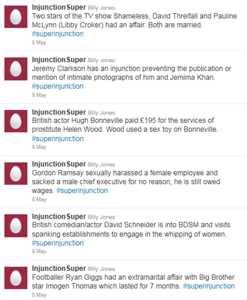In British law, a “superinjunction” is a gag order on the press that extends even to reporting on the fact that there is a gag order on the press. In U.K. courts, these superinjunctions are apparently handed out like popcorn on behalf of any strutting boob with enough pounds sterling or screen time to get the judge’s attention. This can hardly be surprising for a country whose libel laws are so biased that they have given birth to “libel tourism.”

Now, the Twitterverse has no such law. I think you can figure out what happened next. Although newspapers have been fighting against superinjunctions for some time, with one, the Sun, even kicking at the boundaries, one Twitter user just up and pegged it right in the gear.
An anonymous user created a Twitter account, @superinjunction, with the apparent purpose of posting six tweets about the subjects of various injunctions; including actors, a soccer player and a chef.

Now, according to Forbes, the Twitter scoop is “forcing British lawmakers to think about whether such a thing is still feasible in the age of social media, and if it is, how to enforce it.”
What the tweets have done, I think, is given the British press a legal pretext for reporting on the injunctions. They are, the logic goes, not reporting on the material the injunction covered, but on the fact of the injunction being blown.
The first news organization to take this tack is Glasgow’s Sunday Herald. They’ve put a photo of the soccer player, Ryan Giggs, on the front page of their newspaper with a twee black bar over his eyes. It snowballed from there.
The article, an indictment of the superinjunction system and its hypocrisies, attracted enough traffic to crash the Herald’s site. (It’s up now.)
Giggs is pursuing a suit to force disclosure of the Twitter account holder’s name. (He tried to press the suit anonymously but was found out, which seems to be a theme with him.)
Whether the reality of social media will force a change in British law is certainly beyond me. I feel confident, however, in saying that people, like it or not and regardless of the law, will continue to use social media tools like Twitter to tell tales out of school.
Other sources: Technology Review
















